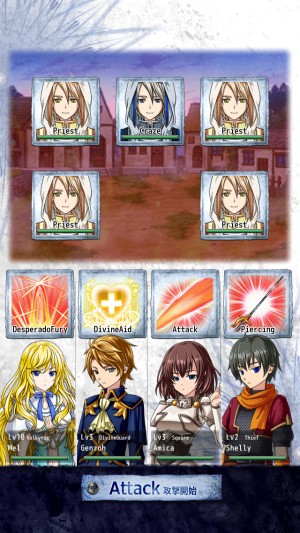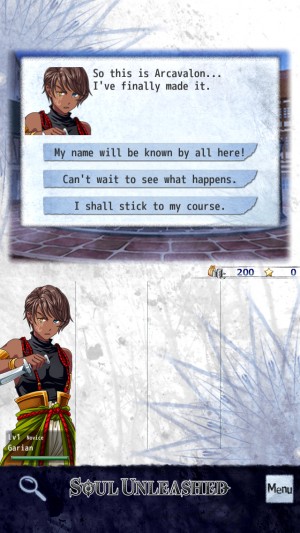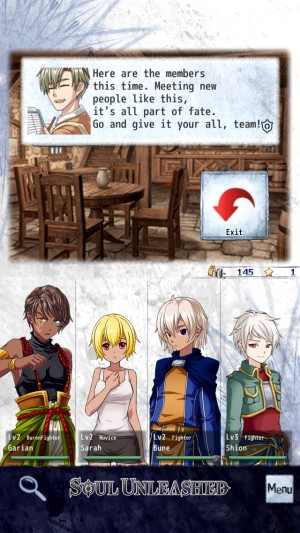 If nothing else, I’ll give the developer of Soul Unleashed (Free) this: I’ve never played anything quite like this before. Oh, all of the parts are familiar, to be sure, but the way they’re combined here is quite unique. Better still, the combination actually works. What we have here is part single-player, turn-based dungeon crawler, part social RPG, and a dash of gamebook. It features probably my favorite implementation of the by now well-worn idea of bringing other player’s characters into fights with you, and yet you can also play the game just fine without any internet connection. In the beginning, quests feel like little slices from a gamebook, but you’re soon having to navigate labyrinthine dungeons and catacombs, fighting off monsters around every corner. It’s an odd beast, but I ended up liking it quite a bit.
If nothing else, I’ll give the developer of Soul Unleashed (Free) this: I’ve never played anything quite like this before. Oh, all of the parts are familiar, to be sure, but the way they’re combined here is quite unique. Better still, the combination actually works. What we have here is part single-player, turn-based dungeon crawler, part social RPG, and a dash of gamebook. It features probably my favorite implementation of the by now well-worn idea of bringing other player’s characters into fights with you, and yet you can also play the game just fine without any internet connection. In the beginning, quests feel like little slices from a gamebook, but you’re soon having to navigate labyrinthine dungeons and catacombs, fighting off monsters around every corner. It’s an odd beast, but I ended up liking it quite a bit.
After a short prologue introducing you to the game’s world, you’re asked to create your character. Apart from which of the three races you choose to play as, all of your decisions here are cosmetic. Each individual category doesn’t have many options to choose from, but there are enough that most people’s characters will probably look different in one way or another. You’ll then need to choose a few starting skills, and this is where the fun begins. There are a ton of skills in this game, and though some might seem completely worthless, you never know when they’ll come in handy during a quest. Each level up will earn you a couple more picks from a short list the game pulls at random, allowing you to build your character in some very specific ways. I built my first character as a pure barehanded fighter, with extra abilities for cooking and lighting up dark places, both of which proved handy in the long run.
 After this creation process, your newly-minted adventurer wanders into town looking for fame, fortune, or both. You can earn them by completing missions that are picked up at the local tavern. Once you’ve built up enough fame, you’ll be able to gain access to other locations in the town that will offer up new events and quests, but for the most part you’ll be operating out of the local pub. The town has plenty of amenities, at least. There’s an equipment shop, an item shop, a blacksmith, and a peculiar woman who can identify items for you and give you a blessing before heading out. You’ll need to gather your party before venturing forth, however, and you can do so at the pub. You don’t get to choose who comes with you on any given quest. The game will randomly assign you three characters. If you’re connected to the internet, these characters will be drawn from those of other players, but if you’re offline the game will provide its own. These characters will only join you for the next mission, success or fail, after which your party disperses.
After this creation process, your newly-minted adventurer wanders into town looking for fame, fortune, or both. You can earn them by completing missions that are picked up at the local tavern. Once you’ve built up enough fame, you’ll be able to gain access to other locations in the town that will offer up new events and quests, but for the most part you’ll be operating out of the local pub. The town has plenty of amenities, at least. There’s an equipment shop, an item shop, a blacksmith, and a peculiar woman who can identify items for you and give you a blessing before heading out. You’ll need to gather your party before venturing forth, however, and you can do so at the pub. You don’t get to choose who comes with you on any given quest. The game will randomly assign you three characters. If you’re connected to the internet, these characters will be drawn from those of other players, but if you’re offline the game will provide its own. These characters will only join you for the next mission, success or fail, after which your party disperses.
That means that every time you attempt a quest, you’ll be going in with a slightly different bag of skills, which in turn affects how or even if you’re able to complete it. On top of that, the specific layouts of dungeons will also change each time you visit them, though particular sections stay the same for puzzle purposes. Some of the skills just add questionably translated flavor text, but it’s all pretty interesting. This setup has a few advantages. It always feels like there might be something new to discover in a quest if you only had a different set of skills, which adds greatly to the game’s replay value. If you’re having trouble with a particular quest, sometimes you can beat a retreat, grab a new party, and be able to overcome it without any extra work on your part. More than anything, it helps the game’s world come alive as a place where you are just another adventurer with useful skills as opposed to the savior of all creation that many RPGs cast the hero as. No single character has all of the talents they need to make it on their own, so forming a party is necessary from a practical standpoint.
Dungeon exploration happens from a first-person point of view. You navigate one step at a time by touching various arrows and doors in the viewing window. It’s quite similar to the older first-person dungeon romps that came out before the advent of smooth scrolling, and it’s very easy to get lost in the bigger areas unless you make a map. The partially random designs don’t do the game a lot of favors in making caves and dungeons easy to parse in your head, and there are some switch and key puzzles that will require you to criss-cross from one point of the dungeon to another and back again. More interestingly, you’ll occasionally come across events when you’re out on a quest that require you to make a role-playing choice. Some of these are illusions in that there’s really only one outcome, but many of them can have a real effect on the outcome of the mission. Plenty of classic dungeon crawlers made liberal use of this in the good old days, but I was pretty surprised to see it here.
 The battle system is a typical turn-based affair, but what makes it interesting is that each character can only choose from a limited set of their moves on each turn. Characters will automatically queue up the action they think is best, but you can override that selection by tapping on them. This will open up a list of the possible actions they can take on that turn. Once you’re happy with everyone’s battle plans, you press a confirm button and away they all go. Assuming any one member of the party survives the battle, everyone is revived with full health at its conclusion, so maintaining your hit points isn’t as difficult as in other games. The big thing you need to watch out for is being hit with a status ailment. Those don’t always go away after battle, and if you don’t have anything to cure them, you might find yourself in a situation where you have to bail on your quest. Having a cook in the party can be very useful in these situations, as preparing a meal and taking a rest generally cures the worst ailments.
The battle system is a typical turn-based affair, but what makes it interesting is that each character can only choose from a limited set of their moves on each turn. Characters will automatically queue up the action they think is best, but you can override that selection by tapping on them. This will open up a list of the possible actions they can take on that turn. Once you’re happy with everyone’s battle plans, you press a confirm button and away they all go. Assuming any one member of the party survives the battle, everyone is revived with full health at its conclusion, so maintaining your hit points isn’t as difficult as in other games. The big thing you need to watch out for is being hit with a status ailment. Those don’t always go away after battle, and if you don’t have anything to cure them, you might find yourself in a situation where you have to bail on your quest. Having a cook in the party can be very useful in these situations, as preparing a meal and taking a rest generally cures the worst ailments.
I almost forgot to mention job classes, which are tightly bound with the skill system. As you unlock new skills, certain combinations will result in a new job class being made available to your character. Certain skills can only be used by specific job classes, and just as there are tons of skills to learn, so too are there quite a few jobs. There are the usual fantasy classes, but there are also things like chefs, merchants, and so on. These job classes also modify your character’s base stats. You can change jobs whenever you like while not on a quest, so if you run into some trouble you can always come back, hop jobs, and try again. The more skills you unlock, the more job classes you’ll open up, and the more versatile your character will be in the long run. It’s just plain fun to see what strange new job class will open up next, too.
All of these elements come together to form a very odd sort of hybrid. The game feels like it’s drawing in equal parts from classic computer RPGs and modern Japanese social RPGs. Rather than the horrifying worst-case scenario such an image presents, Soul Unleashed comes away with mostly the good bits from those two distant cousins and only a few bad ones. Like the vintage games, it can be a bit too complicated for its own good at times, and the answers to some problems are awfully hard to get at unless you’ve got your brain in the right gear. Similar to social RPGs, it doesn’t feel like you’re actually accomplishing a lot from a story point of view most of the time, and the game doesn’t have much of an end in its current version. You just sort of reach the end of the current quests, and then there’s nothing else to do but restart in a new game plus mode. I’d guess the idea is to keep building on it in the future, but my time machine is a bit damaged at the moment, so I instead have to judge it as it is today. Some players will also rankle at the game being designed for play in portrait mode only, but I think it suits it rather well.
 Then there’s the matter of its IAP. I imagine few people like to see a premium currency IAP in their paid single-player games, but it’s not nearly as bad as you might think in Soul Unleashed. The currency in question is called “Lucky Stars", and similarly to most Japanese social RPGs, it can be used to continue if you fail on a quest. You can also use it to buy extra character slots. By default, you only get one character, so if you want to start again, you’ll need to cough up some Lucky Stars. You can earn Lucky Stars by completing quests, more than enough to add a character slot or two for experimentation purposes, and I never once felt like the game’s difficulty was cheating me to get me to cough up Lucky Stars. Of course, that could change as more content is added, but for now, it seems rather benign.
Then there’s the matter of its IAP. I imagine few people like to see a premium currency IAP in their paid single-player games, but it’s not nearly as bad as you might think in Soul Unleashed. The currency in question is called “Lucky Stars", and similarly to most Japanese social RPGs, it can be used to continue if you fail on a quest. You can also use it to buy extra character slots. By default, you only get one character, so if you want to start again, you’ll need to cough up some Lucky Stars. You can earn Lucky Stars by completing quests, more than enough to add a character slot or two for experimentation purposes, and I never once felt like the game’s difficulty was cheating me to get me to cough up Lucky Stars. Of course, that could change as more content is added, but for now, it seems rather benign.
Even with the game’s half-hearted conclusion, I think Soul Unleashed is worth some attention from RPG fans. There are a lot of different little bits and pieces working together in a fairly fresh way here, and it shows a glimpse of one possible future for Japanese single-player mobile RPGs. Like a lot of games with new ideas, not everything works right, and it’s ultimately pretty light on content. That said, I was completely absorbed by the game for a couple of evenings thanks to its enjoyable approach to character development and its gameplay nods to the classics. I can’t say for sure if it’s going to have the same effect on everyone, but the developer does provide a Lite version so you can get the general feel of things before you commit. As for me, I’d certainly be interested to see further games fleshing out this game’s good ideas, because while I think the game isn’t quite where it needs to be, it’s definitely onto something.